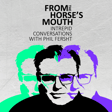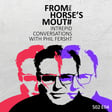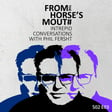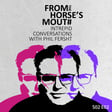Introduction to 'From the Horse's Mouth'
00:00:12
Speaker
You're listening to From the Horse's Mouth, intrepid conversations with Phil First, ready to meet the disruptors who are guiding us to the new great utopia by reshaping our world and pushing past corporate spin for honest conversations about the future impact of current and emerging technologies. Tune in now.
Guest Introductions: Ian Barkin & Tom Davenport
00:00:41
Speaker
So welcome to another edition of Horse's Mouth. I think by this point, you're all familiar with me, Phil first, but joining me today are two esteemed guests, Ian Barkin and Professor Tom Davenport. And, you know, maybe each of you guys, so you've been in and around the world of emerging technology and services for a
Impact of Robotic Process Automation
00:01:04
Speaker
very long time. Could you give us a very quick lay down on, you know, what you guys are doing today?
00:01:10
Speaker
Absolutely. Tom, you want to go first? Go for it. Go for it. Okay. i will I will go first. um So yes, ah Phil, we've we've ah crossed paths and and been on the same path for for well over a decade as as you know. And ultimately it was leveraging the innovation of global talent to help enterprises operate more efficiently, often tapping into arbitrage and then using other sort of platform level innovation.
00:01:40
Speaker
But then 10 years ago, we started to get excited about digitizing and emulating the work those people were doing. We called it robotic process automation. um I had the privilege of having a front row seat to that adventure and set up and ran one of the ah one of the RPA consultancies.
00:01:57
Speaker
And after selling that, I continued my passion and sort of ongoing learning into the broader scope of tech and so this trend of it ah tending to get easier and therefore democratizing the use of it. And that that brought Tom and me together to have a ah great deal of fun over the last year and a half, two years.
AI and Analytics Expertise by Tom Davenport
00:02:18
Speaker
ah I'll speak for myself. I had a great deal of fun. Tom may have um really despised the whole thing, but that's me.
00:02:26
Speaker
um most Most of it was fun. um And I'm Tom Davenport. I am a professor ah um right now, mostly Babson College, but a visiting professor at UVA Darden School and a um a fellow of the MIT Initiative on the Digital Economy and a Deloitte senior advisor. and um um I have for a long time focused on how people use analytics, big data, AI, and I was very interested in the whole democratization issue. um I have less background in the automation space than Ian Moore in the kind of data science space, so we complimented each other well in that regard, and um we were um fortunate enough to write this book together.
00:03:27
Speaker
Well, ah Tom, it all, it all goes back to data. However, we much shiny technology. if We want to throw out this stuff. It's all about bringing our data
'All Hands on Tech' and Citizen Development
00:03:36
Speaker
together. Right. But tell me about this book you've um just released all hands on tech. I love the title. Uh, but why, why should we read this guys? Why shouldn't you read it? It is both good and good for you.
00:03:52
Speaker
Well, um about citizen development, but it does not have to do with voting, which is the topic that everybody is focused on at this moment. um And it's broader. I mean, citizen development, I think, is usually discussed in terms of application development, low code, no code kinds of stuff. And we certainly talk about that a lot, but we also go into citizen automation and citizen data science. and um try to, I think strike a balance, Ian, correct me if you think I'm wrong, between being bullish about it, but also realizing that organizations will have concerns about turning their technology over to their non-professionals. And so we spend a fair amount of time talking about um how to make sure things don't go wrong. Although interestingly, we didn't find many, we talked to
00:04:47
Speaker
what, I don't know, 50 companies. We didn't find any disaster stories really about citizen development. So um maybe it's more caution that is necessary, but we know some organizations are very cautious about
Debating Tech Democratization and Innovation
00:05:01
Speaker
Right. Now, and Phil, we set out to be students of this theme rather than cheerleaders of it. And so many people out there who are listening to this who have a technical background, who run technical programs are probably rolling their eyes because they equate citizen initiatives with with technical debt and gray IT or shadow IT and pain. But ultimately, what we were fascinated by was this digital arc of really powerful technical capabilities are just getting easier to use. I mean, no doubt, especially in the last two years because of generative AI and large language models, it's just easier to do things.
00:05:45
Speaker
And so as a result, it's just it's enabling more and more people to get on this boat of turning ideas into action, whereas they might not have been able to in the past because they weren't Python developers. They weren't part of the IT group. They didn't have the ah not only the permission, but the ability to to build and solve problems that they had.
00:06:07
Speaker
It's totally different now. Whether you have a positive and negative view of citizenry, the fact is this thing is is happening. It's happening everywhere in every enterprise, every corner, nook, cranny of it. so It's everywhere. It's everywhere. so um it is it is It is truly viral. It has gone viral.
00:06:26
Speaker
and beautiful and That's right. Well, that's um it's sort of Borgian, yes, I suppose, um without the cool um face implants. but ah the yeah But the the gist really, and one of the key themes for us in the book is, I mean, but sort of ignore this at your own peril. and did you have You have passionate people who really do want to solve problems that they face every day, and the tools are meeting them in the middle, and they're there for them to use now. And so this is happening.
00:06:55
Speaker
Like, how is citizen developer development or citizenry, as you call it? and She's a word I was not familiar with until just now. um How can enterprises access this type of talent? Is it through some type of gig working platform? I mean, how do you bring these citizen developers to the demanding enterprises who need the help. Right. Tom, you want me to take a crack and then you can fix everything I say? So we have a framework in the book that starts, obviously refers to governance and the fact that you need structures in place to coordinate and no herd this initiative. But the very first
00:07:43
Speaker
component of that framework is effectively it's Genesis, which is ah the the birth of this. And our point really is it's already there. It's already born. So tapping into citizenry is simply looking within your enterprise and realizing and there are people in your HR shared services department that have really struggled with how you're onboarding new employees and have of late started to innovate how they can make it easier and how they can ah close gaps or how they can create apps or how they can better analyze the data that they that they have available to them to build models and maps. And so ah really, the the the gig is, I mean, you're folks internally. And that's that's much what we talked to. we We don't speak about tapping into an external additional resource. I mean, you can. That's that that's outsourcing or or consulting. ah But this is all there. This exists in every enterprise today.
00:08:42
Speaker
and And we think in general that it should be a voluntary activity. um we We don't think you should necessarily press people into service um of developing um technology if they don't really want to, if they're not comfortable, if they're not um interested and curious. but Fortunately, there are enough people out there who are, in in most organizations, um willing and able to do this kind of work. And as Ian suggests, many of them are doing it already, and the you just need to sort of guide it and institutionalize it and encourage it.
Encouraging Workforce to Embrace New Tech
00:09:19
Speaker
Right. The the examples that inform that informed that
00:09:23
Speaker
but of opinion, Phil, come from 10 years ago in the RPA space. When the early the early pitch was, this is so easy, you can train up some people in your F&A back office um operations team to address a few process areas we identified and off they go. Those people may have sort of begrudgingly raise their hand, but they certainly wouldn't weren't given the air cover or the extra time to to do the the RPA sort of modeling, mapping, and digitization. So it's ah the the forced march into citizenry is never one that ends well. um But as as Tom said, there are plenty of people who've got the ideas and the passion and genuinely want to be doing something. yeah
00:10:08
Speaker
Well, the problem with RPA was it was still IT t development. However, you tried to mask it. Some of these applications required ah technology coding, skills and experience. So you were really going to the same people. You go to IT, t say, hey, fix this for me. Be a hero, fix my fix my automation. um There were some ah process-only ah RPA products, but those struggled.
00:10:36
Speaker
to be adopted. And a lot of it was because it got dumbed down too many layers down the enterprise. There wasn't enough passion and enthusiasm for people to say, oh, let's go and fix our inverse processing today. Whereas where I'm going with this now is you talked about Gen. AI. The thing I like about Gen. AI is it's helping people do their job better. It's not this massively disruptive tool. You've gented. We'll get onto that later.
00:11:04
Speaker
but um We, for example, at HFS are an analyst company, so we have a lot of tools that are out of disposal to help us do research. I'm sure you're familiar with this being an academic time as well. We got our analysts together to present to each other how they're using Like one of our analysts uses For Omni to literally take Excel flat file data from surveys and it turns them out into nice charts that you can manipulate. ah Helps come up with some of the key findings that literally say days of work that can be done in very short amounts of time. And then we have other people using ah tools like Claude. Personify is another one I've seen out there.
00:11:52
Speaker
you know And we're getting them to present it to each other, just show what they're doing. And that had the breakthrough for us, whereas I found if you're just saying to everybody, use Gen AI, here's our corporate chat GPT account. People just use it like Google, right? And is that really adding a ton of value? you Just getting a slightly more sophisticated, or less sophisticated, sub changing in many cases.
00:12:14
Speaker
um So how can enterprises you know who aren't doing this really succeed like in terms of, hey, we're going to get people to use tools. We're going to give them the ah pick stuff to play with. But how do you actually get your team generally using it to enhance their jobs more effectively?
00:12:31
Speaker
How do you get people to move from staying lots of nice things and doing a few searches to actually figure figuring out how can I use this to help me write this article or help me design a process or help me with some marketing ideas? And how how do we actually move beyond the lip service?
00:12:49
Speaker
Well, you know, there's the main knowledge um that that needs to be harnessed. In addition, I mean, um you guys both are more familiar with um but workflow automation than I am, but I'm a process improvement oriented person by background. And um I think when people learn how to improve processes, um whether it's Lean or Six Sigma or some other method like that, today it makes no sense for them not to also learn how to automate that
00:13:25
Speaker
process, at least if it's a relatively small process that doesn't involve thousands of of people. um You need to know something about data analysis if you're going to do citizen data analysis and science.
00:13:39
Speaker
um But if you know statistics, it's pretty easy to generate a machine learning model these days with automated machine learning tools. So um I think the combination of the domain knowledge and the relatively easy to learn technology knowledge um is a very powerful one that a lot of people would qualify to do.
00:14:02
Speaker
Totally agree. I do have to take issue with one thing Tom said. He said he is a process improvement individual. He he was the process improvement individual, so check him out. i was I was the one of two um they process big process re-engineering people, but the other one is dead. so i guess and on civil right That got dark quickly, but you win. so see you would draw the um Phil, the interesting thing about RPA, I'll use that because that's my go-to constantly for reference. but ah
00:14:39
Speaker
The way that that was understood by CIOs, CTOs that I used to work with is it enabled you to prototype the future state. and So you weren't building an ERP, you were gluing things together in ways that were more efficient. and Now more so than ever, these these Gen AI tools allow your teams to prototype what it is that they want to see and how things are done. right and So it could be automations and marketing.
00:15:04
Speaker
They could be, you know yeah, you could have them, you could prod them to write more more blog posts for you. Although um one of the things that we do cover in the book that that doesn't get a lot of coverage in in most of the exploration of the citizen concept is the topic of incentivization. And you and this is where RPA failed too, because you just said,
00:15:26
Speaker
like, you have no free time, no extra pay, go use this automation and make your make your process more efficient. That never worked. um And what we did discover is there is this whole trend of people who get good at automation, use it to digitize some of their work, don't tell their their company, their employer, and go off and collect extra jobs just because why not? They're being creative. And if they did tell their job they were doing it, they'd get They'd get no extra pay, no bonus, no incentive, and probably they'd get pinged for it and and you know and reprimanded for for doing things without permission.
00:16:04
Speaker
so while all these ceos are making people come back into the office to prevent john people holding multiple virtual jobs at right and it's It's a byproduct of that. And so so ultimately, you need to to build the appropriate incentive to say you've got the domain knowledge. If you if you have the the mindset and the the the temperament to want to to challenge convention and help us design and help us create things, then then please do. And thank you, and here's a way to encourage you to do that.
Shell's DIY Tools for Employee Empowerment
00:16:40
Speaker
Yeah, I mean, it it all sounds good, but how how does this work in practice? like What areas have you seen the early signs of success with citizenry? know what is ah Where are we seeing staff encouraged to step up and contribute versus areas where it's still very much seedling of an idea? Sure.
00:17:03
Speaker
Should we talk about Shell, for example? It's a great one. A few years ago, I forget the exact time frame. It's in the book. um The CIO, group Group CIO of Shell, a guy named Jay Krotz, said, you know um We need to digitize this business and there simply are not enough IT resources to make it happen. So let's embark upon um a more you know um democratic approach. They didn't like the term citizen development because they thought that um people would be taught ah how to vote or something like that.
00:17:45
Speaker
um So they called it DIY and um he said, you know, let's not do this um on the cheap. He ah took a guy who was a vice president and said, I want you to be in charge of this. And the guy said, I'm really excited about that. I don't need to be a vice president. He said, no, of course you need to be a vice president. um ah They hired a staff. They started to educate people. They worked with Microsoft, as it turns out, um both to get the data ready in Azure and also the Power Platform was just um emerging as ah as a tool and that became their tool of choice. And they um started to beat the bushes for um volunteers. We found a guy named Stevie Smith, who was, what do you say, turning valves for a living?
00:18:38
Speaker
and a refinery in Louisiana, um and he started to do this, and then they are basically a citizen development coach for his part of the business. and They have um several thousand people doing this work. It extended into data science. They um trained a lot of their engineers in how to do citizen data science work. and um Lots and lots of of successful applications. and stevie just Because he's probably listening, to Stevie Sims is a guy.
00:19:15
Speaker
sorry yeah and um and he's the He's one of the inspirational stories that sort of compelled us to to explore this because there were individuals who just, again, they had just a spark.
00:19:25
Speaker
right? he He saw opportunity. He took it upon himself. He then was a champion. He was a sort of a coach and a guide for others within the organization and it did, it spread pretty virally. um Now it it did, one of the things we found was the organizational culture created that sort of substrate that sometimes a better facilitated a spread of this. ah Shell's obviously an organization that's engineer heavy.
00:19:51
Speaker
So you've got people who just generally think a bit more engineering wise and structured and analytical and they approach things that way. So maybe that's a ah better substrate to to plant this and have it grow.
00:20:04
Speaker
um But we also saw it in an advertising agency and in a ah ah um passenger railroad company, which is only one of in the United States, so it was Amtrak. I mean, um it can work in almost any kind of culture, I think. Right. Now, and again, any function, any department, any culture, any company, there are, I mean,
00:20:29
Speaker
If you think there aren't people who understand what they do and want to do it differently and better, then then you're not respecting and the the human resource that has been making companies tick since the beginning.
00:20:44
Speaker
Yeah. um You know, we talk a lot about a burning platform and and the big issue we've had with Gen AI since its inception a couple of years ago, the three, version three at the streets has really been, um where is the burning platform to drive adoption? This isn't like the internet in the nineties where if your business wasn't online, you were basically out of business, right?
00:21:09
Speaker
and um Now we're hearing about a genteck ais the next thing. ah The next wave of excitement because now we can now replace people with virtual people and I'm like you can't do this because ultimately if you don't.
00:21:25
Speaker
make real changes to your underlying infrastructure and data. Just throwing more and more technology at problems, we've proven time and time again isn't the solution. um What I like about Gen AI and some of the things you're talking about is these are actual tools to improve what we do, make us smarter, slicker, better, and um helps us with some technology design that we couldn't do before as non-technical people.
00:21:50
Speaker
But as we look at these next wave of solutions like Agente, are we just going through the same cycle over and over again? Here's the latest technology. Let's throw it out there. um Because you can't ah change how, you can't take advantage of these technologies without changing the underlying data, infrastructure, processes, a behavior ah that goes with it.
00:22:17
Speaker
Yes. that that Tom and I have spent a lot of time together also exploring agentic and challenging what it is and what it isn't and what it hopes to be. um Ultimately, I'll give you my my take on it, which is it's it is a combination of the best capability sets available to us. Some of them happen to be some more of these esoteric and and complex AI-driven algorithms. But at the end of the day, as you said, Phil, if if you you come from a process background,
00:22:48
Speaker
Then you you lean back on that heritage and you know that you need need foundation on which to to apply and use any of this stuff. And that's around process, it's around guardrails, it's around policy, it's around change management. And that's also why we we like that this book's coming out now because while people are now fascinated by this this new wave of AI, agentics, fundamentally it's still a human story.
00:23:14
Speaker
and agentics is only going to be successful, ah especially because it seems to be atomizing each small step of a process now can be done by ah a real specialist at that particular step.
00:23:26
Speaker
But it's the humans who know what it is they should actually be doing. And if you believe that those steps aren't going to change and cause some of those things to break over time, then you weren't involved in the last few waves of automation and enterprise work.
Challenges in RPA and AI Job Displacement
00:23:40
Speaker
Well, but we were involved in, I mean, we wrote the first animal support in 2012 on RPA.
00:23:46
Speaker
and The sales proposition was simply sign up for a hundred bots and, hey, you might be able to replace a hundred people in time. And that's how you got companies to sign up for things. Cause it was this promise of taking up headcount. And that, you know, that's how outsource. Outsource. Outsource to headcount. Right. That made it even easier.
00:24:09
Speaker
Yeah. And, um, you know, the frustrations mounted when companies realized we're not taking our headcount because we're just taking away little pieces of people's jobs. We're not taking away people's entire jobs. Um, that was the big problem. And and then the second problem was the technology. I couldn't do half the stuff, the marketing promise that could do as well. But now we get into. Gen AI was a bit more realistic in that.
00:24:35
Speaker
we quickly realize this isn't just a headcount replacement opportunity, this is more of a, we can actually become more productive and more personalized and smarter what we do. As we get into a gente, I just see a very similar neolithic mindset that we had with our PA, which is, ah,
00:24:54
Speaker
you know I can now buy the latest version of Salesforce, ServiceNow, whatever, and I have agents plundered. I can now finally replace people with technology. You can't. this is my Now, if someone came up with some software and just said, hey, you can replace 100 accounts with this, everyone would buy it in five minutes flat, if it freakin' worked.
00:25:13
Speaker
Um, I just think we're at the point where companies have got so jaded by this. It's like, but we can enhance people. We can create wonderful avatars. We can do all sorts of things, but if we can't generally replace ad count, we ain't going there. Um, now I can hark back a decade to our lovely friend we mentioned earlier. Um, I think I'm needing an IPsoft. That was like the first big digital agent that was real agentic a decade ago.
00:25:42
Speaker
And part of the problem they had was they they were trying to sell Emilia, I think, for like $18k per Emilia license per headcount a year. And and and most most enterprises turned and said, look, I can just hire someone in the Philippines, which that was the point. i and Now we're at this point of everybody is jumping on this new wave.
00:26:03
Speaker
um I normally, I'm an analyst. I love technology. I love looking at how we can make this technology work, so technology will be effective. But I just don't see it. If companies generally can't look at the decades of debt they built up with their data, with their technology, with their skills, with their people, I just don't see the the shift happening. I think it's a lot of noise that will eventually be supplanted with the next wave of noise.
00:26:32
Speaker
Well, I've got strong opinions about this. oh I'll give you some, which is, as you absolutely said, outsourcing our heritage, a solved an enterprise problem by offering a solution, which was the work that you had done will continue to to get done, but it will be done for less money and and perhaps analyzed a little bit more than you were able to do yourself. And with SLAs, you couldn't necessarily hold your own team to.
00:26:57
Speaker
And then you move to automation, RPA specifically, where you were atomizing and fragmenting a process down and identifying 40% that could be automated, but not not a a congealed 40%. It was 5% here, 10% there, 5% later on. And that that created that that challenge to manage.
00:27:19
Speaker
the winning proposition is going to be the best of both worlds. um The winning proposition is going to be an agentic business automation approach that incorporates all the right tools, including agentic, but also absolutely including RPA and, heck, Excel macros and whatever else gets the job done appropriately.
00:27:38
Speaker
And if you hold it as well, they're also heaped out and get it at our own. Yeah, because this does not work without humans. And so whether you call it a measure of fabric or a platform or anything else, the winners will be folks who are able to bring those together in a sensible way and allow you to adopt an outcome and get her done with whatever the right tools are at the time and orchestrate that and evolve it over time as you know LLMs become just that much more capable and start to hallucinate a little bit less and can be incorporated a little bit more. um So that's the that's the sort of partner you're looking for um who understands the the cool technology but also understands the challenge at hand. Okay.
00:28:23
Speaker
Yeah, I'm very much a believer in augmentation rather than large scale automation. And that's really what we've seen in the vast majority of organizations so far with AI and the citizen activity. I think citizen development activities that we talk about are almost totally an augmentation oriented activity. I don't know. Did we encounter anybody, Ian, who said we laid off lots of people as a result of citizen development? um I don't think so.
00:28:51
Speaker
No, because again, it's it's tapping into those people who understand what good looks like for your internal customers, your external customers is able to make it, able to actually do it, whether it is data analysis and modeling or just gluing apps together.
00:29:09
Speaker
and And those people should be celebrated and given more remit to keep doing that because there is no shortage of work. And as you said, there's also no shortage of just messy data and chaos and spaghetti systems and legacy and everything else. And this is ah a way to address that because almost every single story that Tom and I found, one of the underlying components was we know we need to digitally transform. We also know we just don't have the bandwidth.
00:29:38
Speaker
We don't have enough IT t team, we don't have enough time, we don't have enough budget to quadruple the size of the IT team. So what are you left to do but tap the tap the folks with the ideas.
Evolving Role of CIOs with New Tech
00:29:50
Speaker
Yeah, the the role of the CIO is going through an unbelievable amount of change. and I think this is something where successful CIOs will embrace new ways of doing things versus ones. I had one on a panel recently who literally said, um I've given up training my staff on the next big thing because something else is going to come along in six months time. That was the issue. Great.
00:30:16
Speaker
but also to close the patent office because everything, um, those sorts of things are just, I mean, that's, that's, that's fatigue and frustration, but that's, that's not a strategy. Yeah. Well, it's, it's slow. It's a slow disruption. I mean, I i took out a current chance policy ended last year. Uh, I was spending quite a lot of money for it. And then literally about three months ago, one of their competitors just reached out to me out the blue and said, we can offer you the same policy for half the price. I'm like, wow, really?
00:30:46
Speaker
And then I started talking to them a bit more. They're both well-known brands. I went out them. They got way more um focused on their cost infrastructure. They can deliver the same policies at a much lower cost. And they're also smart enough to you know, figure out how to sell to people like me using ah really cool analytics and data to figure that out. And I'm thinking, this is just a natural evolution. The smarter businesses who've become slicker, they figured out how to leverage this technology better, don't have these clunking great spaghetti code infrastructures, following them around and cost, following them around, are the ones who are going to win out over the long term.
00:31:25
Speaker
I feel like this podcast is just for you to announce that you spend money on things and you want all your vendors to offer you big discounts. I mean, that's... ah Well, yeah, we're I'm going to ask for the HFS or discount. On your book. Next, by the way. You got the HFS discount. You have the book at home already. I don't want for free. I'd have got it signed as well if I could get it signed. I'm very happy about that. Make the worth either at something or less than nothing.
00:31:54
Speaker
This is great. Well, thank you very much for joining me today. It's great to hear about citizenry and we'll have you, I think, Ian, you're going to join us at our summit New York in a few weeks. So we'll talk more then. And yeah, hopefully good luck with Sales of the New Bark and I really hope you get this citizenry ideal firmly on the map this time.
00:32:16
Speaker
Yeah, fortunately there's nothing else happening in the world, so people can just focus on our book. and Absolutely. Literally nothing happening in
Conclusion and Listener Engagement
00:32:24
Speaker
November. ah Yeah, I'm supposed to have a post-election panel at this summit online, but let's just wait a moment. I hope it's not the day after the election because I think things may be going on for quite a while. No, I think most people are not doing anything a day after election. Thanks, everyone. i'm in Thanks, Tom. Thanks, Ian. Really enjoyed the conversation. Thank you.
00:32:49
Speaker
Thanks for tuning in to From the Horse's Mouth. Intrepid conversations with Phil first. Remember to follow Phil on LinkedIn and subscribe and like on YouTube, Apple Podcasts, Spotify, or your favourite platform for no-nonsense takes on the intricate dance between technology, business and ideological systems. Got something to add to the discussion? Let's have it. Drop us a line at From the Horse's Mouth at hfsresearch dot.com or connect with Phil on LinkedIn.









